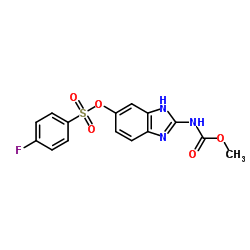Biochemical effects of luxabendazole on Trichinella spiralis.
A Criado-Fornelio, C de Armas-Serra, A Jimenez-Gonzalez, N Casado-Escribano, F Rodriguez-Caabeiro
文献索引:Parasitol. Res. 76(6) , 518-20, (1990)
全文:HTML全文
摘要
Biochemical changes produced by luxabendazole in muscle-stage Trichinella spiralis larvae consisted of a decrease in free glucose and glycogen levels (46.71% and 35.66%, respectively) after in vivo treatment, slight in vitro inhibition of fumarate reductase activity (24.15%) and, finally, inhibition of [3H]-colchicine-tubulin binding, which was found to be of a competitive nature, with an inhibition constant (Ki) of 0.9 x 10(-7) M. In a parallel study, luxabendazole did not appear to be inhibitory to [3H]-colchicine binding to pig-brain tubulin.
相关化合物
| 结构式 | 名称/CAS号 | 分子式 | 全部文献 |
|---|---|---|---|
 |
鲁苯达唑
CAS:90509-02-7 |
C15H12FN3O5S |
|
Activity of luxabendazole against liver flukes, gastrointest...
1988-01-01 [Parasitol. Res. 75(1) , 14-8, (1988)] |
|
Determination of luxabendazole in biological fluids by high-...
[J. Chromatogr. A. 578(2) , 321-6, (1992)] |
|
Bacterial mutagenic evaluation of Luxabendazole, a new broad...
1996-01-01 [Mutagenesis 11(1) , 27-31, (1996)] |
|
The intestinal absorption of Luxabendazole in rats.
1994-11-01 [J. Pharm. Biomed. Anal. 12(11) , 1471-4, (1994)] |
|
Effects of luxabendazole on the tegument of Fasciola hepatic...
1994-03-01 [J. Helminthol. 68(1) , 73-80, (1994)] |